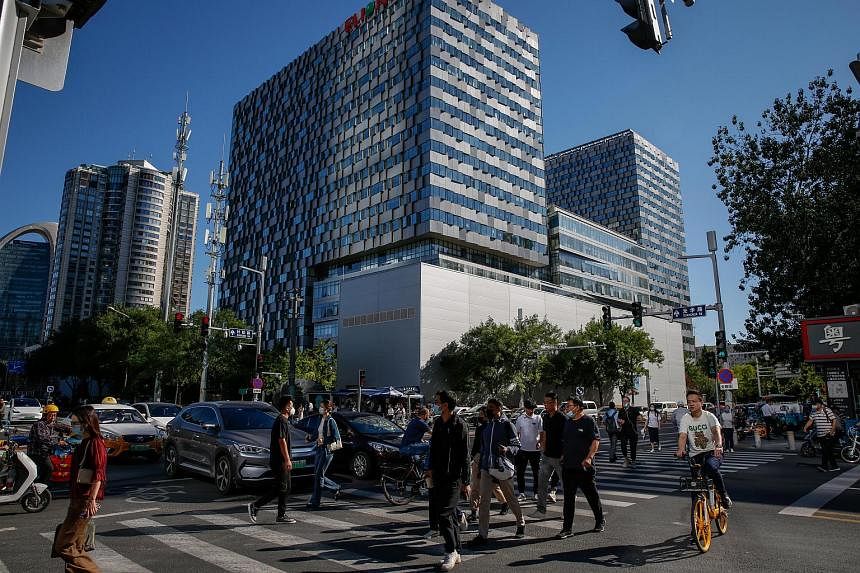BEIJING - Covid-19 restrictions are stifling spending in China's vast consumer market and turning some popular retailers and automakers into stock laggards.
The outpouring of pent-up demand has been absent in zero-Covid-19 China. Instead, an uncertain growth outlook, coupled with a record high youth jobless rate, has caused consumer discretionary stocks in the MSCI China Index to underperform the broader gauge this quarter. That is a stark contrast to a double-digit gain for a global consumer index.
Investors have little hopes of a near-term revival in China's consumption. On top of lockdowns in major cities, health officials have tightened travel restrictions ahead of a national holiday, reinforcing their commitment to the zero-Covid-19 strategy as the crucial twice-a-decade party congress approaches.
"People are beginning to cut down on spending again - Covid-19 is one thing, another thing is, overall, the economic backdrop itself is deteriorating," said Ms Crystal Chan, head of investment specialist of Principal Asset Management (Asia). "This is a big threat to the Chinese economy and that is why we are avoiding some of the consumer discretionary names in our Asian portfolio."
The MSCI China's sub-index on consumer discretionary stocks has fallen more than 14 per cent this quarter, trailing the benchmark's 12.6 per cent loss. Among the worst performers are Pop Mart International Group - a high-end toy retailer - falling more than 50 per cent, and luxury car dealer Zhongsheng Group, down more than a third.
China has seen retail sales contract from a year earlier through July, in contrast to growth rates of about 8 per cent or more before the pandemic. Consumer confidence remains far below the 100 threshold, indicating dominant pessimism.
While the nation's consumer market - the world's largest - remains too important for investors to shun, a broader policy push towards promoting equality and discouraging extravagant wealth is another factor that is complicating investment decisions. In a speech this month, President Xi Jinping called on people to "avoid excessive consumption" and "glorify thriftiness" as a new, greener way of living.
"People are not networking any more in person, so they downgrade consumption in apparels, expensive watches, luxury handbags. It is natural," said Mr Paul Pong, managing director at Pegasus Fund Managers. "They are happy to buy cheaper brands."
Amid the overall weakness, investors are seeing a silver lining in companies that cater to a so-called "consumption downgrade" trend by selling cheaper products.
Shares of Pinduoduo, which offers more discount through a group-buying model and targets clients in lower-tier cities, have jumped 40 per cent in the past month, the biggest gain in a gauge of Chinese stocks traded in the US.
"In general, we stay very selective in consumer, avoiding mid-level brands with weak value proposition and weak brand recognition," said Ms Jian Shi Cortesi, investment director at GAM Investment Management in Zurich, adding the firm has exposure to Pinduoduo and Vipshop, an online discount retailer.
To be sure, the market's potential remains strong with China's ballooning middle class and the prospect for a spending outburst once pandemic restrictions are abandoned. HSBC expects China to retain its position as the world's biggest consumer market in the decades ahead, with a growing upper-middle class that earns more than US$50 (S$70) a day.
But for investors, Covid-19 restrictions and equality-promoting policies remain key risks.
"Put simply, China cannot count on a consumption-driven recovery," said Mr Raymond Yeung, chief economist for Greater China at Australia and New Zealand Banking Group. "In the longer term, 'common prosperity', 'profit sharing' and remuneration cap will hurt high-end spending. The luxurious segment will be hit." BLOOMBERG

